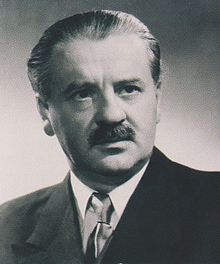Obrichko Dursila
Obrishko Dursila | |
|---|---|
 | |
| Mervoret of Drevstran | |
| In office 1954–1959 | |
| Preceded by | Ernesto Skolad |
| Succeeded by | Marveil Urshlo |
| Personal details | |
| Political party | Vanguard Democrats |
| Children | 3 |
| Profession | Political Philosopher |
Obrichko Dursila was a political philosopher, anarchist activist, and Mervoret of Drevstran. He was the main promoter of anarchism and "Vanguard Democracy" in Eastern Belisaria, organizing and piloting a growing network of Free Associations despite persecutions from the regime of Enersto Skolad. The failure of the latter to arrest Dursila turned him into the iconic figure of the resistance to the "Little Colonel", leading to the domination of the opposition by the Anarchists and to the events known as the Black Streets Days where Dursila, with the help of protesters but also by members of Yednosc! and of the military turned against Skolad, was able to overthrow the dictator. With General Andervi Bogerra he was one of the two leading figure of the Provisory Executive Committee which organized the elections of the Constituent Assembly, itself tasked with redacting a new constitution for the country. The Constituent Assembly was itself composed in its majority of Anarchists, granting Dursila and his ideas a large influence over the modern political structures of Drevstran. After the completion of the Constitution, both the Assembly and the Provisory Executive Commitee were dissolved and Dursila was elected Mervoret of Drevstran in 1954.
Dursila's mandate was characterized by the legalisation of worker unions and rural cooperatives, the creation of the first national Labour Code, the "war against private schooling and the churches", effort to decentralize the political decision process, and an attempt to replace private ownership with personal property. The excesses of many Anarchists also revealed the weakness of Dursila's control over them and placed him in a difficult situation, too mild for the radicals and too radicals for the moderates. This led to him losing the 1959 elections in favour of the Liberal conservator Marveil Urshlo.
Dursila would continue his political activism but with far less success than before. He only knew a regain of popularity during the seventies among the "Academic Anarchists". He would die in a car accident in 1977. After the announce of his death, a three days long national mourning was decreed by the Parliament and he was burried with the "Honors of the Nation" and since 1981, his statue was added to the "Heroes Gallery" of the Parliament, alongside other celebrated national figures such as Vilvo Orbraggar.